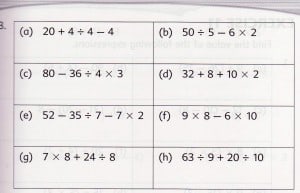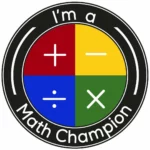Sometimes the strategies used in the Singapore Math materials look different. Number bonds, bar models, place value charts, arrays and area models can be unfamiliar to parents. Most schools adopting Primary Mathematics host Parent Nights to walk parents through the new materials, the program and to share why the school decided to switch from their old curriculum.
I’ve done dozens of these parent nights and common concerns run through the questions. After a presentation and Q & A parent session this week, a parent approached me about her son’s home enjoyment that afternoon.
“How am I expected to help my fourth grader?” she asked, “This Singapore Math is so different.”
She opened her son’s 4A workbook and showed me the problems she couldn’t help her son with:
Unfortunately for this parent, there’s nothing “Singaporean” about order of operations.
She couldn’t help her son because she didn’t remember elementary school math. In fact, she had never heard the term “Order of Operations”. I tried, “Please Excuse My Dear Aunt Sally,” something many adults were taught back in the day… Nope, that drew a blank as well.
After I explained what the order of operations is, I offered the parent two pieces of advice.
- Include a note with her son’s home enjoyment, something along the lines of “We struggled with these problems.” The teacher needs to know this. Home enjoyment is practice for your student and provides feedback for their teacher. The teacher needs to know if the lesson taught that day at school could be completed individually by the student that night at home. If not, there was a breakdown somewhere.
This parent note tells the teacher a couple of things:
- The student was able to complete the first two parts of the assignment that included problems with two operations, but couldn’t work the final exercise where the problems had three operations.
- Something was lost between the teacher’s lesson and this student. Was he in the bathroom? Did the teacher’s lesson and guided practice not include three operations? Are there attention issues? Did the student just not “get it” and not ask questions? Many things could have created this disconnect. Was it a single student, or are there more that struggled?
- This parent may not be able to help her son with 4th-grade math.
- Pick up a copy of a book on elementary mathematics. One of my favorites is Arithmetic For Parents: A Book for Grownups about Children’s Mathematics. In the foreword, the author includes insights from his time in an elementary classroom:
Elementary mathematics isn’t simple at all. It has depth and beauty.
The book is written for parents that want to be an active participant in their child’s studies, as well as the “reader who wishes to return to his childhood mathematics, from a different angle.”
Good math teaching is just good math teaching. While there are some differences in the strategies used in the Singapore books, teaching math so students understand the concepts as well as master the algorithm or rule is the goal.
Do you help your child with their home enjoyment? What happens when you are fuzzy on the concepts your child is learning?




















